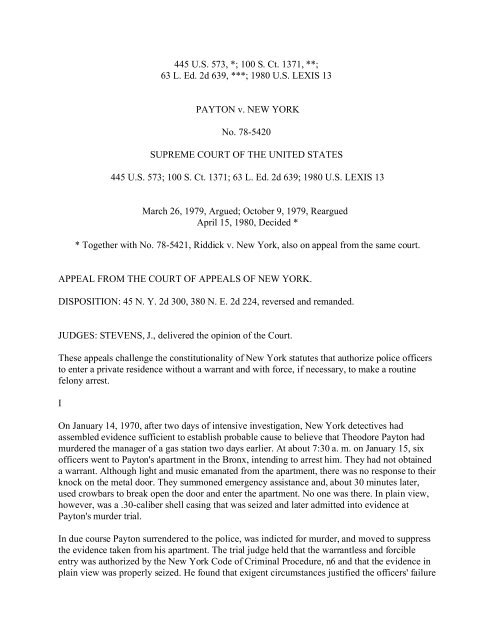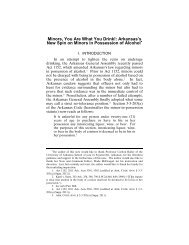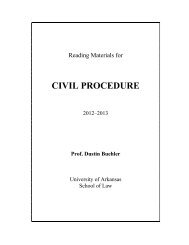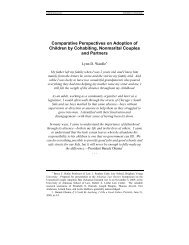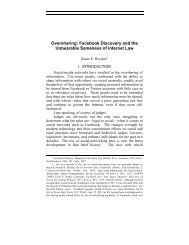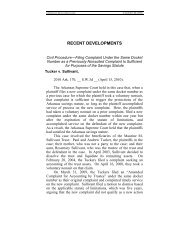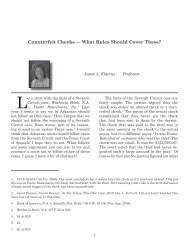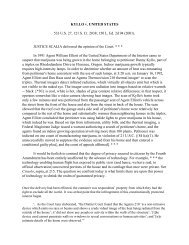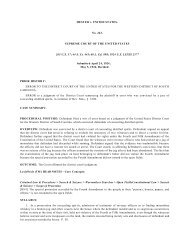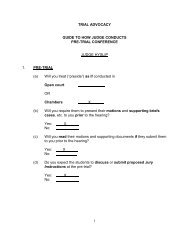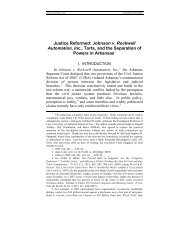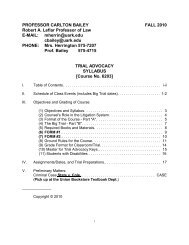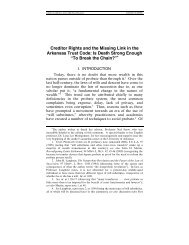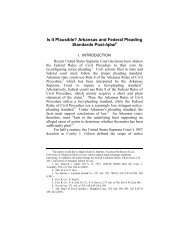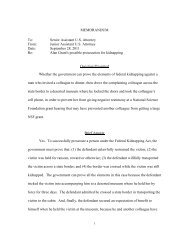PAYTON v. NEW YORK
PAYTON v. NEW YORK
PAYTON v. NEW YORK
Create successful ePaper yourself
Turn your PDF publications into a flip-book with our unique Google optimized e-Paper software.
445 U.S. 573, *; 100 S. Ct. 1371, **;<br />
63 L. Ed. 2d 639, ***; 1980 U.S. LEXIS 13<br />
<strong>PAYTON</strong> v. <strong>NEW</strong> <strong>YORK</strong><br />
No. 78-5420<br />
SUPREME COURT OF THE UNITED STATES<br />
445 U.S. 573; 100 S. Ct. 1371; 63 L. Ed. 2d 639; 1980 U.S. LEXIS 13<br />
March 26, 1979, Argued; October 9, 1979, Reargued<br />
April 15, 1980, Decided *<br />
* Together with No. 78-5421, Riddick v. New York, also on appeal from the same court.<br />
APPEAL FROM THE COURT OF APPEALS OF <strong>NEW</strong> <strong>YORK</strong>.<br />
DISPOSITION: 45 N. Y. 2d 300, 380 N. E. 2d 224, reversed and remanded.<br />
JUDGES: STEVENS, J., delivered the opinion of the Court.<br />
These appeals challenge the constitutionality of New York statutes that authorize police officers<br />
to enter a private residence without a warrant and with force, if necessary, to make a routine<br />
felony arrest.<br />
I<br />
On January 14, 1970, after two days of intensive investigation, New York detectives had<br />
assembled evidence sufficient to establish probable cause to believe that Theodore Payton had<br />
murdered the manager of a gas station two days earlier. At about 7:30 a. m. on January 15, six<br />
officers went to Payton's apartment in the Bronx, intending to arrest him. They had not obtained<br />
a warrant. Although light and music emanated from the apartment, there was no response to their<br />
knock on the metal door. They summoned emergency assistance and, about 30 minutes later,<br />
used crowbars to break open the door and enter the apartment. No one was there. In plain view,<br />
however, was a .30-caliber shell casing that was seized and later admitted into evidence at<br />
Payton's murder trial.<br />
In due course Payton surrendered to the police, was indicted for murder, and moved to suppress<br />
the evidence taken from his apartment. The trial judge held that the warrantless and forcible<br />
entry was authorized by the New York Code of Criminal Procedure, n6 and that the evidence in<br />
plain view was properly seized. He found that exigent circumstances justified the officers' failure
to announce their purpose before entering the apartment as required by the statute.<br />
On March 14, 1974, Obie Riddick was arrested for the commission of two armed robberies that<br />
had occurred in 1971. He had been identified by the victims in June 1973, and in January 1974<br />
the police had learned his address. They did not obtain a warrant for his arrest. At about noon on<br />
March 14, a detective, accompanied by three other officers, knocked on the door of the Queens<br />
house where Riddick was living. When his young son opened the door, they could see Riddick<br />
sitting in bed covered by a sheet. They entered the house and placed him under arrest. Before<br />
permitting him to dress, they opened a chest of drawers two feet from the bed in search of<br />
weapons and found narcotics and related paraphernalia. Riddick was subsequently indicted on<br />
narcotics charges. At a suppression hearing, the trial judge held that the warrantless entry into his<br />
home was authorized by the revised New York statute, and that the search of the immediate area<br />
was reasonable under Chimel v. California, 395 U.S. 752<br />
The New York Court of Appeals, in a single opinion, affirmed the convictions of both Payton<br />
and Riddick.<br />
Before addressing the narrow question presented by these appeals, n19 we put to one side other<br />
related problems that are not presented today. Although it is arguable that the warrantless entry<br />
to effect Payton's arrest might have been justified by exigent circumstances, none of the New<br />
York courts relied on any such justification. The Court of Appeals majority treated both Payton's<br />
and Riddick's cases as involving routine arrests in which there was ample time to obtain a<br />
warrant, n20 and we will do the same. Accordingly, we have no occasion to consider the sort of<br />
emergency or dangerous situation, described in our cases as "exigent circumstances," that would<br />
justify a warrantless entry into a home for the purpose of either arrest or search.<br />
Nor do these cases raise any question concerning the authority of the police, without either a<br />
search or arrest warrant, to enter a third party's home to arrest a suspect. The police broke into<br />
Payton's apartment intending to arrest Payton, and they arrested Riddick in his own dwelling. We<br />
also note that in neither case is it argued that the police lacked probable cause to believe that the<br />
suspect was at home when they entered. Finally, in both cases we are dealing with entries into<br />
homes made without the consent of any occupant. In Payton, the police used crowbars to break<br />
down the door and in Riddick, although his 3-year-old son answered the door, the police entered<br />
before Riddick had an opportunity either to object or to consent.<br />
II<br />
The simple language of the Amendment applies equally to seizures of persons and to seizures of<br />
property. Our analysis in this case may therefore properly commence with rules that have been<br />
well established in Fourth Amendment litigation involving tangible items. As the Court<br />
reiterated just a few years ago, the "physical entry of the home is the chief evil against which the<br />
wording of the Fourth Amendment is directed. " United States v. United States District Court,<br />
407 U.S. 297, 313. And we have long adhered to the view that the warrant procedure minimizes<br />
the danger of needless intrusions of that sort.<br />
The majority of the New York Court of Appeals, however, suggested that there is a substantial
difference in the relative intrusiveness of an entry to search for property and an entry to search<br />
for a person. See n. 13, supra. It is true that the area that may legally be searched is broader when<br />
executing a search warrant than when executing an arrest warrant in the home. See Chimel v.<br />
California, 395 U.S. 752. This difference may be more theoretical than real, however, because<br />
the police may need to check the entire premises for safety reasons, and sometimes they ignore<br />
the restrictions on searches incident to arrest.<br />
But the critical point is that any differences in the intrusiveness of entries to search and entries to<br />
arrest are merely ones of degree rather than kind. The two intrusions share this fundamental<br />
characteristic: the breach of the entrance to an individual's home. The Fourth Amendment<br />
protects the individual's privacy in a variety of settings. In none is the zone of privacy more<br />
clearly defined than when bounded by the unambiguous physical dimensions of an individual's<br />
home -- a zone that finds its roots in clear and specific constitutional terms: HN9"The right of<br />
the people to be secure in their . . . houses . . . shall not be violated." That language<br />
unequivocally establishes the proposition that "[at] the very core [of the Fourth Amendment]<br />
stands the right of a man to retreat into his own home and there be free from unreasonable<br />
governmental intrusion." Silverman v. United States, 365 U.S. 505, 511. In terms that apply<br />
equally to seizures of property and to seizures of persons, the Fourth Amendment has drawn a<br />
firm line at the entrance to the house. Absent exigent circumstances, that threshold may not<br />
reasonably be crossed without a warrant.<br />
IV<br />
The parties have argued at some length about the practical consequences of a warrant<br />
requirement as a precondition to a felony arrest in the home. n55 In the absence of any evidence<br />
that effective law enforcement has suffered in those States that already have such a requirement,<br />
we are inclined to view such arguments with skepticism. More fundamentally, however, such<br />
arguments of policy must give way to a constitutional command that we consider to be<br />
unequivocal.<br />
- - - - - - - - - - - - - - Footnotes - - - - - - - - - - - - - - -<br />
n55 The State of New York argues that the warrant requirement will pressure police to seek<br />
warrants and make arrests too hurriedly, thus increasing the likelihood of arresting innocent<br />
people; that it will divert scarce resources thereby interfering with the police's ability to do<br />
thorough investigations; that it will penalize the police for deliberate planning; and that it will<br />
lead to more injuries. Appellants counter that careful planning is possible and that the police<br />
need not rush to get a warrant, because if an exigency arises necessitating immediate arrest in the<br />
course of an orderly investigation, arrest without a warrant is permissible; that the warrant<br />
procedure will decrease the likelihood that an innocent person will be arrested; that the<br />
inconvenience of obtaining a warrant and the potential for diversion of resources is exaggerated<br />
by the State; and that there is no basis for the assertion that the time required to obtain a warrant<br />
would create peril.<br />
- - - - - - - - - - - - End Footnotes- - - - - - - - - - - - - -
Finally, we note the State's suggestion that only a search warrant based on probable cause to<br />
believe the suspect is at home at a given time can adequately protect the privacy interests at<br />
stake, and since such a warrant requirement is manifestly impractical, there need be no warrant<br />
of any kind. We find this ingenious argument unpersuasive. It is true that an arrest warrant<br />
requirement may afford less protection than a search warrant requirement, but it will suffice to<br />
interpose the magistrate's determination of probable cause between the zealous officer and the<br />
citizen. If there is sufficient evidence of a citizen's participation in a felony to persuade a<br />
judicial officer that his arrest is justified, it is constitutionally reasonable to require him to open<br />
his doors to the officers of the law. Thus, for Fourth Amendment purposes, an arrest warrant<br />
founded on probable cause implicitly carries with it the limited authority to enter a dwelling in<br />
which the suspect lives when there is reason to believe the suspect is within.<br />
Because no arrest warrant was obtained in either of these cases, the judgments must be reversed<br />
and the cases remanded to the New York Court of Appeals for further proceedings not<br />
inconsistent with this opinion.<br />
It is so ordered.<br />
CONCURBY: BLACKMUN<br />
CONCUR: MR. JUSTICE BLACKMUN, concurring.<br />
MR. JUSTICE WHITE, with whom THE CHIEF JUSTICE and MR. JUSTICE REHNQUIST<br />
join, dissenting.<br />
It is necessary in each case to assess realistically the actual extent of invasion of constitutionally<br />
protected privacy. Further, as MR. JUSTICE POWELL observed in United States v. Watson,<br />
supra, at 428 (concurring opinion), all arrests involve serious intrusions into an individual's<br />
privacy and dignity. Yet we settled in Watson that the intrusiveness of a public arrest is not<br />
enough to mandate the obtaining of a warrant. The inquiry in the present case, therefore, is<br />
whether the incremental intrusiveness that results from an arrest's being made in the dwelling is<br />
enough to support an inflexible constitutional rule requiring warrants for such arrests whenever<br />
exigent circumstances are not present.<br />
Today's decision ignores the carefully crafted restrictions on the common-law power of arrest<br />
entry and thereby overestimates the dangers inherent in that practice. At common law, absent<br />
exigent circumstances, entries to arrest could be made only for felony. Even in cases of felony,<br />
the officers were required to announce their presence, demand admission, and be refused entry<br />
before they were entitled to break doors. Further, it seems generally accepted that entries could<br />
be made only during daylight hours. And, in my view, the officer entering to arrest must have<br />
reasonable grounds to believe, not only that the arrestee has committed a crime, but also that the<br />
person suspected is present in the house at the time of the entry.<br />
n13 I do not necessarily disagree with the Court's discussion of the quantum of probable cause<br />
necessary to make a valid home arrest. The Court indicates that only an arrest warrant, and not a
search warrant, is required. Ante, at 602-603. To obtain the warrant, therefore, the officers need<br />
only show probable cause that a crime has been committed and that the suspect committed it.<br />
However, under today's decision, the officers apparently need an extra increment of probable<br />
cause when executing the arrest warrant, namely, grounds to believe that the suspect is within<br />
the dwelling. Ibid.<br />
- - - - - - - - - - - - End Footnotes- - - - - - - - - - - - - -<br />
These four restrictions on home arrests -- felony, knock and announce, daytime, and stringent<br />
probable cause -- constitute powerful and complementary protections for the privacy interests<br />
associated with the home. The felony requirement guards against abusive or arbitrary<br />
enforcement and ensures that invasions of the home occur only in case of the most serious<br />
crimes. The knock-and-announce and daytime requirements protect individuals against the fear,<br />
humiliation, and embarrassment of being roused from their beds in states of partial or complete<br />
undress. And these requirements allow the arrestee to surrender at his front door, thereby<br />
maintaining his dignity and preventing the officers from entering other rooms of the dwelling.<br />
The stringent probable-cause requirement would help ensure against the possibility that the<br />
police would enter when the suspect was not home, and, in searching for him, frighten members<br />
of the family or ransack parts of the house, seizing items in plain view. In short, these<br />
requirements, taken together, permit an individual suspected of a serious crime to surrender at<br />
the front door of his dwelling and thereby avoid most of the [**1396] humiliation and indignity<br />
that the Court seems to believe necessarily accompany a house arrest entry. Such a front-door<br />
arrest, in my view, is no more intrusive on personal privacy than the public warrantless arrests<br />
which we found to pass constitutional muster in Watson. n14<br />
- - - - - - - - - - - - - - Footnotes - - - - - - - - - - - - - - -<br />
n14 If the suspect flees or hides, of course, the intrusiveness of the entry will be somewhat<br />
greater; but the policeman's hands should not be tied merely because of the possibility that the<br />
suspect will fail to cooperate with legitimate actions by law enforcement personnel.<br />
- - - - - - - - - - - - End Footnotes- - - - - - - - - - - - - -<br />
All of these limitations on warrantless arrest entries are satisfied on the facts of the present cases.<br />
The arrests here were for serious felonies -- murder and armed robbery -- and both occurred<br />
during daylight hours. The authorizing statutes required that the police announce their business<br />
and demand entry; neither Payton nor Riddick makes any contention that these statutory<br />
requirements were not fulfilled. And it is not argued that the police had no probable cause to<br />
believe that both Payton and Riddick were in their dwellings at the time of the entries. Today's<br />
decision, therefore, sweeps away any possibility that warrantless home entries might be<br />
permitted in some limited situations other than those in which exigent circumstances are<br />
present. The Court substitutes, in one sweeping decision, a rigid constitutional rule in place of<br />
the common-law approach, evolved over hundreds of years, which achieved a flexible<br />
accommodation between the demands of personal privacy and the legitimate needs of law<br />
enforcement.
A rule permitting warrantless arrest entries would not pose a danger that officers would use their<br />
entry power as a pretext to justify an otherwise invalid warrantless search. A search pursuant to a<br />
warrantless arrest entry will rarely, if ever, be as complete as one under authority of a search<br />
warrant. If the suspect surrenders at the door, the officers may not enter other rooms. Of course,<br />
the suspect may flee or hide, or may not be at home, but the officers cannot anticipate the first<br />
two of these possibilities and the last is unlikely given the requirement of probable cause to<br />
believe that the suspect is at home. Even when officers are justified in searching other rooms,<br />
they may seize only items within the arrestee's possession or immediate control or items in plain<br />
view discovered during the course of a search reasonably directed at discovering a hiding<br />
suspect. Hence a warrantless home entry is likely to uncover far less evidence than a search<br />
conducted under authority of a search warrant. Furthermore, an arrest entry will inevitably tip off<br />
the suspects and likely result in destruction or removal of evidence not uncovered during the<br />
arrest. I therefore cannot believe that the police would take the risk of losing valuable evidence<br />
through a pretextual arrest entry rather than applying to a magistrate for a search warrant.<br />
B<br />
While exaggerating the invasion of personal privacy involved in home arrests, the Court fails to<br />
account for the danger that its rule will "severely hamper effective law enforcement," United<br />
States v. Watson, 423 U.S., at 431 (POWELL, J., concurring); Gerstein v. Pugh, 420 U.S., at<br />
113. The policeman on his beat must now make subtle discriminations that perplex even judges<br />
in their chambers. As MR. JUSTICE POWELL noted, concurring in United States v. Watson,<br />
supra, police will sometimes delay making an arrest, even after probable cause is established, in<br />
order to be sure that they have enough evidence to convict. Then, if they suddenly have to arrest,<br />
they run the risk that the subsequent exigency will not excuse their prior failure to obtain a<br />
warrant. This problem cannot effectively be cured by obtaining a warrant as soon as probable<br />
cause is established because of the chance that the warrant will go stale before the arrest is made.<br />
Further, police officers will often face the difficult task of deciding whether the circumstances<br />
are sufficiently exigent to justify their entry to arrest without a warrant. This is a decision that<br />
must be made quickly in the most trying of circumstances. If the officers mistakenly decide that<br />
the circumstances are exigent, the arrest will be invalid and any evidence seized incident to the<br />
arrest or in plain view will be excluded at trial. On the other hand, if the officers mistakenly<br />
determine that exigent circumstances are lacking, they may refrain from making the arrest, thus<br />
creating the possibility that a dangerous criminal will escape into the community. The police<br />
could reduce the likelihood of escape by staking out all possible exits until the circumstances<br />
become clearly exigent or a warrant is obtained. But the costs of such a stakeout seem excessive<br />
in an era of rising crime and scarce police resources.<br />
The uncertainty inherent in the exigent-circumstances determination burdens the judicial system<br />
as well. In the case of searches, exigent circumstances are sufficiently unusual that this Court has<br />
determined that the benefits of a warrant outweigh the burdens imposed, including the burdens<br />
on the judicial system. In contrast, arrests recurringly involve exigent circumstances, and this<br />
Court has heretofore held that a warrant can be dispensed with without undue sacrifice in Fourth<br />
Amendment values. The situation should be no different with respect to arrests in the home.<br />
Under today's decision, whenever the police have made a warrantless home arrest there will be
the possibility of "endless litigation with respect to the existence of exigent circumstances,<br />
whether it was practicable to get a warrant, whether the suspect was about to flee, and the like,"<br />
United States v. Watson, supra, at 423-424.<br />
Our cases establish that the ultimate test under the Fourth Amendment is one of<br />
"reasonableness." Marshall v. Barlow's, Inc., 436 U.S. 307, 315-316 (1978); Camara v.<br />
Municipal Court, 387 U.S. 523, 539 (1967). I cannot join the Court in declaring unreasonable a<br />
practice which has been thought entirely reasonable by so many for so long. It would be far<br />
preferable to adopt a clear and simple rule: after knocking and announcing their presence, police<br />
may enter the home to make a daytime arrest without a warrant when there is probable cause to<br />
believe that the person to be arrested committed a felony and is present in the house. This rule<br />
would best comport with the common-law background, with the traditional practice in the States,<br />
and with the history and policies of the Fourth Amendment. Accordingly, I respectfully dissent.


